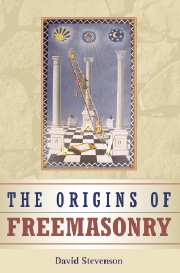Book contents
- Frontmatter
- Contents
- List of plates
- Preface
- List of abbreviations and conventions
- 1 Introduction
- 2 The Medieval contribution
- 3 William Schaw, master of works and general warden
- 4 The Sinelairs of Roslin and the masters of works
- 5 The Renaissance contribution
- 6 Rituals of identification and initiation
- 7 Sir Robert Moray: masonry, symbolism and ethics
- 8 The early Scottish lodges
- 9 Early Scottish and English freemasonry
- Appendix: Early (pre-1710) masonic lodges in Scotland
- Bibliographical note
- Index
- Plate section
9 - Early Scottish and English freemasonry
Published online by Cambridge University Press: 06 July 2010
- Frontmatter
- Contents
- List of plates
- Preface
- List of abbreviations and conventions
- 1 Introduction
- 2 The Medieval contribution
- 3 William Schaw, master of works and general warden
- 4 The Sinelairs of Roslin and the masters of works
- 5 The Renaissance contribution
- 6 Rituals of identification and initiation
- 7 Sir Robert Moray: masonry, symbolism and ethics
- 8 The early Scottish lodges
- 9 Early Scottish and English freemasonry
- Appendix: Early (pre-1710) masonic lodges in Scotland
- Bibliographical note
- Index
- Plate section
Summary
Freemasonry in seventeenth-century Scotland
There is evidence that 25 masonic lodges had come into existence in Scotland by 1710 – though it is possible that a few of those which can only be traced through isolated seventeenth-century references were no longer active in 1710. The fact that some lodges (Linlithgow; Canongate Kilwinning; Canongate and Leith) are only known through single surviving references makes it likely that there were other lodges that have left no trace of their existence. How many of these there were is impossible to say, but probably their numbers were limited and they were mainly located in the smaller royal burghs. A 1705 tax roll shows 14 burghs paying over 1 per cent of the total tax imposed on the burghs, and these may be taken to be the largest population centres in the country. Pre-1710 lodges are known in 11 of these 14 burghs, and in 1 of the 3 exceptions, Ayr, it is known that the local masons attended Kilwinning Lodge. This leaves the masons of Kirkcaldy and Montrose without known lodges, but the former at least may well have had a lodge: in 1758 the Grand Lodge of Scotland, usually cautious about accepting extravagant claims to antiquity, accepted that the Lodge of Kirkcaldy had existed for over a century. But not all royal burghs can be assumed to have had lodges before 1710. The Lodge of Peebles was not founded until 1716, and the Lodge of Brechin's possession of laws dated 1714 may suggest that it was then being organised for the first time.
- Type
- Chapter
- Information
- The Origins of FreemasonryScotland's Century, 1590–1710, pp. 213 - 233Publisher: Cambridge University PressPrint publication year: 1988



